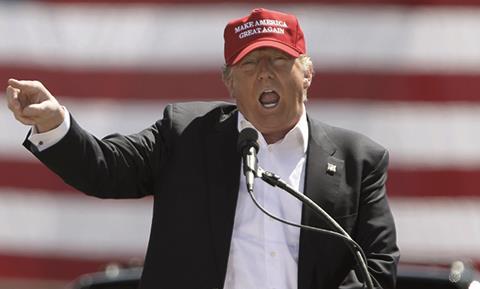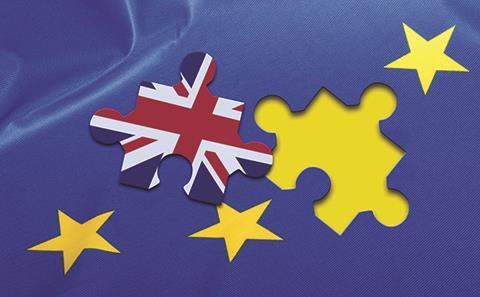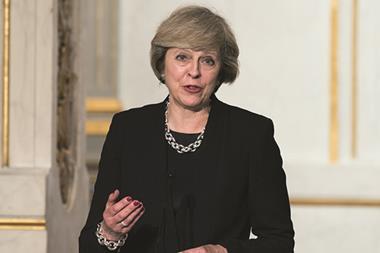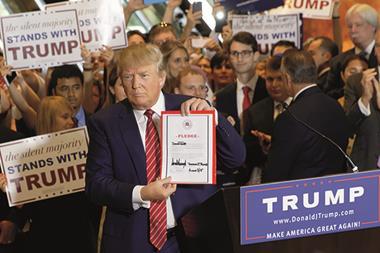The ‘shock’ US election result has given economists, analysts and other speculators – who had until now been absorbed by Brexit – something new to worry about.

But as a regular visitor to the US and someone who has followed the election closely, Donald Trump’s victory comes as little surprise.
In spite of the absurdity of some of his policies, he succeeded in performing one of the most extraordinary movements in modern politics.
While Clinton’s campaign was marred by corruption, a failure to earn respect and a lack of trust, Trump – while no stranger to gaffes – remained unflappable, using his considerable media skills to repeatedly bounce back and appearing, remarkably, the more honest candidate (and, as an aside, whilst spending substantially less money on his campaign).

The relatively close race and the fact more than five million Americans voted neither for Clinton nor Trump but for independents, highlights a level of dissatisfaction with both candidates. For a significant number of voters, the US political system failed to put forward a satisfactory contender. Many voted for Clinton as the “least bad” option. But many did not.
For those who felt fatigued by the Clinton era and wary of the controversy surrounding her, there may well have been a feeling that Trump – notwithstanding some serious personality flaws – was more genuine and, as a businessman, more likely to lead the US to economic prosperity.
With a four-year term and a team around him, how much damage could his dubious opinions really do? Trump’s victory is worrying because it highlights that a country that is considered a leader in the western world is prepared to overlook some truly shocking opinions and behaviour.
Economy over morality
Americans speaking about why they voted for Trump mostly say they accept that he has shortcomings but see these as irrelevant to his ability to do the job. In other words, they were prepared to ignore questionable morals in return for economic strength for the nation.
The fact that a man famed for his sexist remarks attracted 53% of white female voters is a case in point and represents a considerable backward step for the free world.
When Theresa May in her first speech as prime minister talked about making Britain a country that works for everyone, engaging with people who are simply “getting by” and bridging the gap between the haves and the have nots, she was tapping into the fact that the Brexit vote was a reaction by a working-class majority who felt a sense of injustice, inequality and a lack of attention from policy makers and for whom ideologies and international affairs were less important than personal wealth and well-being.

Trump’s appeal for many was that he was outspoken, politically incorrect, and – crucially – not a politician. According to exit polls, he was backed by 53% of men and 58% of white people, compared to just 8% of black voters and 29% of Hispanic voters.
Trump was the anti-establishment choice for a white, working-class majority who felt abandoned and disappointed by current politicians. The power of this demographic was underestimated in the run-up to Brexit and was underestimated again during the US election campaigns.
Impact on property
But what of the effect of Trump’s victory on the property market? It is early days. Trump has threatened to put up trade barriers and be more isolationist in his policies. Undoubtedly, the health of the US economy will affect Europe and protectionist policies, if implemented, are likely to cause a slowdown in global trade, which may in turn impact real estate markets worldwide.
In times of uncertainty, safe-haven locations – which London remains, regardless of Brexit – become more popular. International investors – particularly those from South America or Asia, who might have looked at the US as a destination for investment, may well feel less welcomed by America and might now look to London and key cities in Europe instead. In fact, anecdotally, even as early as this week, this has been reported.
Trump’s attitude towards international relations are perhaps most concerning, however. Caught in between Russia and the US, a situation where Vladimir Putin has an opportunity to flex his muscles could be dangerous indeed.
Time will tell what effect Trump in the White House will have on the world’s economies and property markets. However, what cannot be ignored is that Trump’s election and Brexit are two events which reflect a huge mass of disenchanted voters still feeling the effects of the global financial crisis and rejecting globalisation, immigration and traditional politics.
Failure to listen to, and cater for, this demographic in terms of policy, housing and employment opportunities, could lead to further extremist voting in the future. This is a constituency that must not be ignored.





























No comments yet